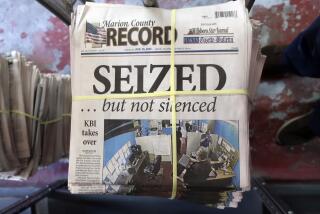Justices Likely to Bar Media From Searches at Homes
WASHINGTON — The justices of the Supreme Court, who know a lot about the law and legal practice, said they were surprised Wednesday to learn something new.
They were told some police officers thought, at least until recently, that they were permitted to take news reporters and TV camera crews into a private home when they executed a search warrant.
“This is an amazing invasion of privacy!” said Justice Sandra Day O’Connor. “Just right into the house?” she asked in incredulous tones.
She was referring to a 1992 incident in which federal marshals barged into the home of a sleeping Maryland couple at dawn--and brought with them a reporter and photographer for the Washington Post. The couple, who were the parents of a man being sought, were photographed in their nightclothes. They sued the marshals who conducted the raid and their case came before the high court Wednesday.
In a second case heard at the same time, a Montana rancher is suing the federal wildlife agents who brought a CNN camera crew onto his property.
“Why isn’t it obvious?” asked Justice Stephen G. Breyer, that it was wrong to invade a homeowner’s privacy with a camera crew.
“Is it just the media? Can you bring along your sister-in-law?” a sarcastic Justice Antonin Scalia asked the lawyer for one of the officers. “Personally, I’d rather it be your sister-in-law.”
The tone of the oral argument strongly suggests that the court will rule it unconstitutional for police officers to take along the news media when they go into private homes. Search warrants authorize officers, not others, to enter a private home, the justices said.
It is not clear, however, that they will allow the officers in these two cases to be sued.
As for the officers, their best defense is a version of the line used by Vice President Al Gore when he was questioned about using White House phones to make fund-raising call. There was “no controlling legal authority” that said this was illegal, Gore said.
Similarly, the lawyers for the marshals and federal agents being sued in the media ride-along cases say that there was no clear ruling declaring this illegal.
Under a separate doctrine, officers and other public officials are immune from being sued, except when they violate a person’s “clearly established” rights. It was not clear until recently that it was illegal for them to take a television crew when they go on private property.
But U.S. appeals courts in New York and San Francisco have outlawed such joint police-press operations. The 9th Circuit Court, siding with the Montana rancher, said that federal agents are not authorized to turn a law enforcement operation “into television theatricals.”
The CNN news team hoped to expose violations of environmental laws by ranchers who are poisoning endangered bald eagles.
The justices will go behind closed doors later this week to decide two questions. Is it illegal for police to bring reporters with them when they enter private homes? If so, was this clear when the Maryland and Montana cases arose?
The court will hand down a ruling by late June.
More to Read
Get the L.A. Times Politics newsletter
Deeply reported insights into legislation, politics and policy from Sacramento, Washington and beyond. In your inbox three times per week.
You may occasionally receive promotional content from the Los Angeles Times.











